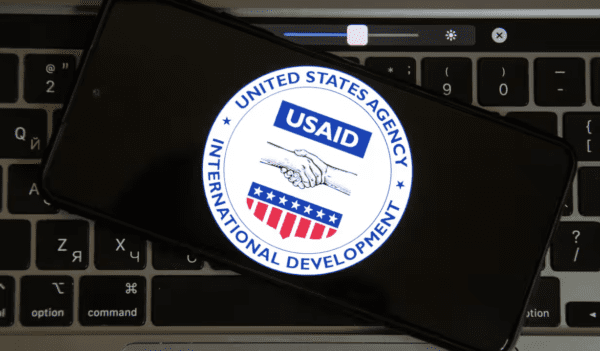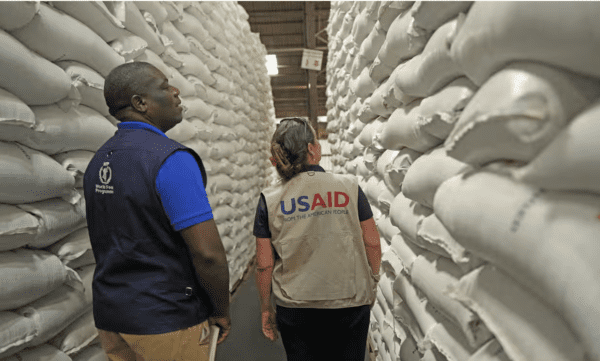On January 20, President Trump announced an executive order to freeze US foreign aid for 90 days. The order to halt most USAID operations is devastating for millions of people who rely upon the donor and the thousands of employees forced on leave and at risk of losing their jobs permanently.
Following the announcement to freeze USAID operations, a lawsuit was swiftly filed against the Trump administration by the American Foreign Service Association and the American Federation of Government Employees, two groups representing foreign service officers and other USAID employees. The ruling judge, Carl Nichols, agreed that the groups had demonstrated sufficient evidence that members operating on behalf of the US in high-risk environments were facing “irreparable injury” from leave orders and issued a temporary restraining order to block the purge of employees.

A worker removes the sign for the US’s Agency of International Development (USAID) after Trump ordered its closure. Source: Photograph: Zuma Press/Alamy Live News
However, as of February 14, the restraining order’s time has run out, and now only 611 of 10,000 workers, deemed essential, will be permitted to continue working. As the world’s largest donor of humanitarian aid, the United State’s sudden withdrawal from aid operations is one of many policy changes resulting from Trump’s “America first” mandate.
The impact of withdrawing life-saving humanitarian aid, including food, medical assistance, and disaster relief, is already being felt by communities worldwide. One report by the Office of Inspector General cites major concern over food aid, noting that close to half a billion dollars of food aid is at risk of spoilage. In Sudan alone, 816,000 people rely on US-funded soup kitchens, which have now been shut down.

USAID officials inspect $11 million food donation in Harare, Zimbabwe. Source: Tsvangirayi Mukwazhi/AP
The World Health Organization has reported that programs tackling highly contagious viruses, including HIV, polio, pox, and bird flu, have also been affected by the freeze. Suspending these important programs, like the President’s Emergency Plan for Aids Relief (PEPFAR), which provides services to 50 countries, will have irreversible and lasting consequences.
Aside from humanitarian relief, USAID provided $268 million of essential funding to independent media outlets in countries where freedom of the press is extremely limited. Without funding, many of these independent outlets are expected to close, which will lead to a surge of misinformation and the spread of government propaganda.
Even anti-terrorism operations have been affected. For instance, the suspension of AID has made it more challenging to track any wrongful usage of official assistance. The ordered leave of workers on programs that vet the safe usage of US taxpayer funds in higher-risk countries like Afghanistan, Iraq, and Lebanon has left them understaffed, making itis more likely for funds to be appropriated by terrorist groups. Additionally, anti-terrorism intelligence efforts were interrupted, including a program collecting Al Qaeda-related information in the Ivory Coast. Moreover, of international concern is the destabilization of two (closed) Syrian camps which hold tens of thousands of people accused of affiliation with the Islamic State (IS) where mass riots and breakouts are expected if assistance does not resume.

Photo of the Al-Hol displacement camp in Kasaka governorate, Syria, which is described as the “breeding ground for the next generation of ISIS.”. Source: Delil Souleiman / AFP via Getty Images file
Although often perceived as a moral obligation to offset some of the world’s inequality, development assistance is increasingly beneficial to donor countries in a globalized world. In other words, USAID benefits American citizens by making their country more secure by reducing poverty and instability, fostering environments beneficial for their businesses, and reducing the pressures for immigration.
Trump has defended his decision, citing that USAID is “incompetent and corrupt,” and reports have suggested that his administration intends to merge USAID with the State Department. Although the Secretary of State, Marco Rubio, claims that the US does not plan to stop distributing aid but rather reposition initiatives to align with US priorities, the future of USAID and its priorities remain unclear.
Featured image: People protesting on February 5 against the dismantling of USAID. Source: Demetrius Freeman/The Washington Post via Getty Images







